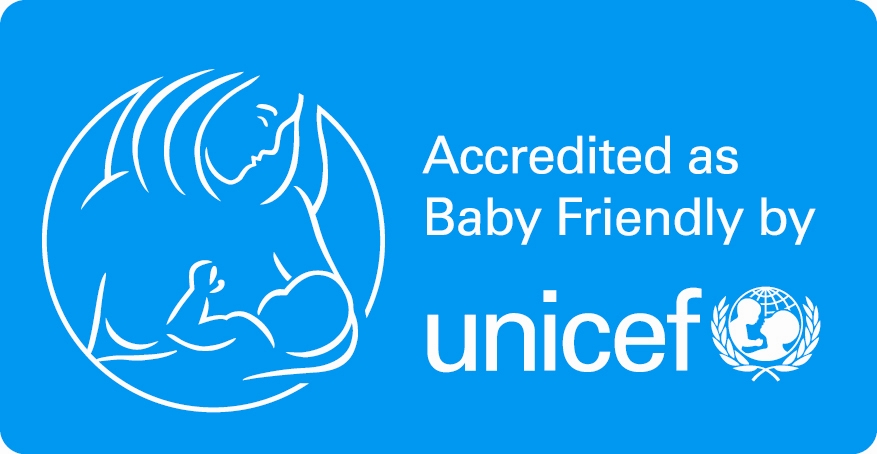Our maternity services have been accredited by UNICEF as Baby Friendly since 2002 and it is very important to us to support women and their families in their baby feeding choices, and in building a close and loving relationship with their baby.
We recommend feeding your baby responsively. This is responding to your baby when they show feeding cues such as rooting, hand to mouth movements and wriggling. Ways to respond to and comfort your baby are:

• cuddling your baby
• frequent skin-to-skin contact
• offering a breastfeed for comfort as well as for nutrition
• keeping your baby near to you
• touching, massaging and rocking your baby
• talking to your baby
Do not leave your baby to cry.
You may find this link to Building a Happy Baby Leaflet helpful
Infant Feeding Team
All midwives, maternity support workers, maternity infant feeding assistants and neonatal nurses receive training in infant feeding. This training is updated regularly to ensure the advice and support we offer you is up to date, consistent and appropriate. Our obstetric and paediatric doctors also have the opportunity for regular training (obstetric doctors specialise in pregnancy and childbirth and paediatricians specialise in babies and children).
During Pregnancy
During pregnancy, your baby’s brain is growing quickly and you can help this development by taking some time out to relax and talk to him/her, to stroke your bump and maybe play some music to him/her. Encourage other family members to do the same.
Dudley Group NHS Foundation Trust run regular breastfeeding workshops and mom-to-mom classes to help pregnant women and their families prepare for feeding and caring for their new baby. We strongly recommend attending however you think you might feed your baby. To book please call 01384 244358 between 10.00 am and 12.00 noon.
Antenatal Hand Expression
Women start to produce colostrum (early milk) during pregnancy. Learning to hand express is a useful skill for all new mothers. It is important that in the early days baby only receives his mother’s milk if possible. If the unexpected happens and your baby has feeding difficulties or health problems, you will find it easier to express your milk if you have practised beforehand. You will also be able to store this colostrum that you express so that you will have a small supply available should your baby need it. We recommend hand expression of colostrum from 36 weeks of pregnancy. Please speak to your midwife for more information and to obtain a hand expression kit.
Skin-to-Skin Contact
When your baby is born hold him against your skin as soon as possible and for as long as you want. Skin-to-skin contact is a lovely way to say hello. Some mothers do not decide how to feed their baby until after birth. When your baby is born, skin-to-skin contact and holding your baby can make you feel differently, so it is a good idea to keep an open mind.
However you decide to feed your baby, we encourage all mothers to have skin-to-skin contact with their baby. Skin-to-skin contact can:
• be relaxing for you and your baby
• encourage your baby to feed
• regulate your baby’s breathing, heart rate and temperature
• protect your baby from infection
• help maintain your baby’s blood glucose level
• help you to bond with your baby
As baby relaxes he will begin to search around for your breast making tiny mouthing and head bobbing movements. If you decide to breastfeed let your baby take his time to seek out and find your breast as he is learning exactly what to do to get that valuable first feed. You may decide to only give your baby one breastfeed but this still has many benefits for your baby.
If you choose to bottle feed this is a good time to give that special first feed while still in skin-to-skin contact with your baby.
It is also recommended that dads and birth partners have skin-to-skin contact with their baby.
Helping you baby to grow and develop
New babies have a strong need to be close to their parents, as this helps them to feel secure and loved. Keep your baby close to you so that you can recognise the signals that he/she make to tell you that they are hungry or want a cuddle. Responding to these signals will comfort and calm your baby which will also help you to feel calm and relaxed and will help with breastfeeding. Holding your baby when he is crying helps him to feel loved and secure, even if he does not stop crying immediately. When babies feel secure they release a hormone called oxytocin, this helps their brain to grow and develop, helping them to be happy babies and more confident children and adults.
Having a new baby can be challenging. However, by keeping baby close you will soon start to understand what your baby needs. Research shows that baby’s cared for in this way grow into toddlers who are less likely to be clingy. You cannot spoil your baby.
For more information: https://www.unicef.org.uk/babyfriendly/baby-friendly-resources/relationship-building-resources/building-a-happy-baby/
The following staff are key to our feeding support service:
Specialist Midwife Infant Feeding
These are experienced midwives:
• International Board Certified Lactation Consultants having specialist knowledge about feeding so they can give support to women with feeding their baby
• lead and train our infant feeding team
• are contactable Monday-Friday, 9am to 5pm, via the main switchboard on (01384) 456111
Community Breastfeeding Support Workers
Their role is to provide support and advice to women in the community about feeding their baby. They are:
• mothers themselves and have experience of breastfeeding
• have extra training to support breastfeeding
• available Monday-Friday, 9am to 5pm
For more information:










